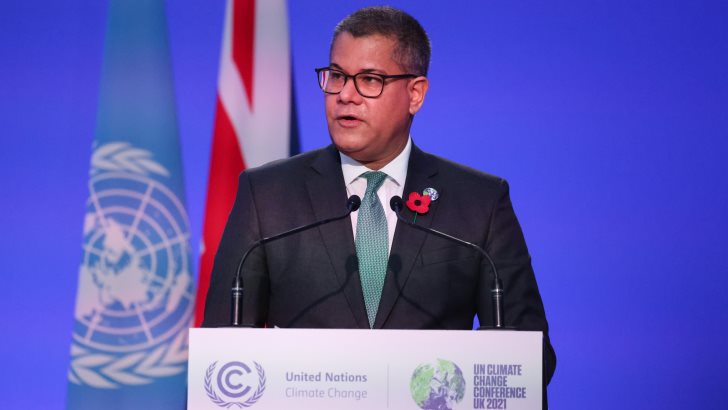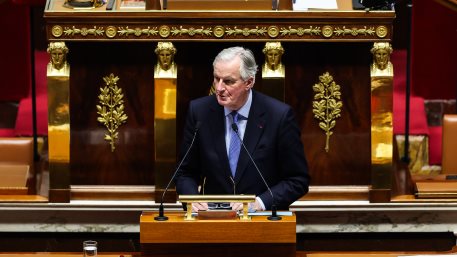
The highly anticipated 26th United Nations Climate Conference has finally begun, taking place in Glasgow until the 12th of November. World leaders and representatives of key non-governmental organisations (NGOs) will debate the best roads ahead towards achieving net-zero global emissions by the middle of the century. And even though all participants claim to recognise the perilousness of climate change, COP26 deliberations hit a road bum right from day one.
Some of the biggest carbon polluters, including Russia, China, India and Brazil, refused to commit to achieving the net-zero goal exactly by 2050 and instead ambiguously vowed to do so "by or around mid-century". The widening discrepancy between the assurances provided by developed vs developing economies casts a shadow of a doubt on the effectiveness of COP26's eventual outcome.
The disagreement fault line reveals the deeply-rooted political mistrust between East and West and pressing contentious points on matters of global economic significance. In light of all of these potential rupture points, here is our breakdown of the most pressing political challenges that could jeopardise COP26.
Where the Political Zeitgeist Clouds Matters of Common Interest
Can Britain mitigate the tensions? Being the host of the conference, Britain's role as a mediator between the camps and chief proponent of the goals set forward by the conference participants cannot be overstated. However, how likely is it that Boris Johnson decides to pivot the global attention to leverage his own political agenda at home?
WATCH LIVE: Prime Minister @BorisJohnson holds a press conference at #G20Italy https://t.co/ARDgLsyLfQ
— UK Prime Minister (@10DowningStreet) October 31, 2021
Britain currently grapples with a sizable resurgence of covid-19 cases and the fallout from the recent global energy squeeze, both of which have put Johnson's government in a tight spot with limited space for political manoeuvring. And the COP26 represents a perfect opportunity to shift the public's focus away from Britain's internal struggles.
Britain has already made significant headway towards fulfilling its environmental commitments, such as cutting emissions by 44 per cent over the last thirty years. However, its current political hurdles pose a significant threat to its ability to keep making such progress in the future. Perhaps that is why Britain's role on climate was emphasised even before the goals of the conference were laid out in the introductory material.
The Hardliners Made Themselves Known Right from the Start
Can Russia and China be expected to play ball? From the get-go, stringent pushback from the negotiators of some of the world's greatest polluters strained negotiations, as Russia, China, Brazil, and India refused to commit to a strict deadline to achieve net-zero emissions.
The political clout created by the ambiguous commitment to achieve the task "around mid-Century" represents a multi-layered opposition to environmental collaboration.
China's economy is still considered developing, and Xi Jinping would probably resist most condemnations by the industrialised West. Particularly since China's economy exhibits such a proclivity to withstand the pandemic fallout while managing to reduce its overall carbon footprint by clamping down on crypto mining. This can be used as a potential bargaining chip by the Chinese communist party on the question of coal.
Russia, in turn, is in a much better position to accommodate the demands of the Conference in light of the massive deposits of natural gas it sits on. However, energy has long been a political leverage used by Vladimir Putin to intimidate the EU by threatening supply disruptions.
Russian President Vladimir Putin will deliver a recorded message to the COP26 climate conference in Glasgow, the Kremlin said on Monday, but there are no arrangements for the leader of the world's no. 4 greenhouse gas emitter to address the summit live. https://t.co/s1tAjjKgfY
— Reuters Science News (@ReutersScience) November 1, 2021
To get Russia more involved with the agenda of COP26, Johnson would have to mediate between France's Macron and Germany's Merkel on the one side and Putin on the other. It would be exceedingly difficult to get either camp to agree to make any concessions given the uncertain political environment in Europe.
Johnson would find it very challenging to balance the opposing demands of the two sides because of his own unsecured position. The tumultuous Brexit negotiations have distanced 10 Downing Street from Brussels, while Europe continues to reel from the aforementioned energy squeeze. All of these contributing factors would make it more difficult to get Putin to play ball with the frazzled European leaders.
Social Discord Stymies the Green Progress
It goes without saying that the degree of U.S. involvement in limiting global emissions will be one of the key determinants of the success of COP26. The U.S. participation in the 2009 Paris Agreement was one of the keystone achievements of the Obama Administration. However, Donald Trump rebuffed Obama's pledges by withdrawing the country from the Agreement during his tenure in the White House.
Joe Biden, Obama's former Vice President, succeeded Trump in Washington and has so far been working towards restoring America's role as an environmental leader on the global stage. However, his efforts do not preclude the possibility of future departures from the net-zero course.
As I told world leaders today: Ending the pandemic is the ultimate key to unlocking the disruptions we’re all contending with, but we have to take action now to reduce the supply chain backlogs that we’re facing.
— President Biden (@POTUS) October 31, 2021
That’s precisely what the measures I announced today will do. pic.twitter.com/QsYB6DtdeI
American society's deep divisions manifest the likelihood of more seesaws in the country's political direction in the future. On the one hand, movements on the left like wokeism, social justice warriors (SJW), and cancel culture have continuously muddled the lines between liberalism and progressivism. As a consequence of the radical left's attempts to break down any power dynamic within American society they deem oppressive or discriminatory, many on the centre have veered towards the right.
This has led to the rise in popularity of radical movements on the far right as well, a prime example being QAnon. By feeding into the completely unfounded claims that the 2020 election was "stolen by the Democrats", hardline Trump supporters try to lay the groundwork for a Trump 2024 campaign. They continuously search for support from those desensitised with the radical left, which could be detrimental to the long term environmental efforts of the current administration.
Electing a GOP president, not even necessarily having to be Trump, with an affinity for populism, would be highly injurious to America's green ambitions. Social discord bolsters belief in conspiracies both on the left and on the right, which redirects the public's attention away from matters such as environmental protection.
The COP26 faces various multi-layered challenges, spanning from old political bickering to newly emerging social disagreements. And with nothing less than humanity's sustainable future at stake, world leaders would have to overcome massive obstacles in Glasgow over the next couple of weeks if any resolutions are to be had.




















